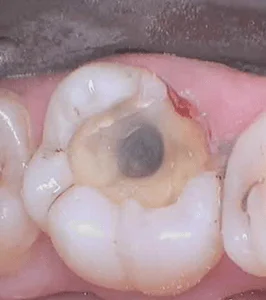Dental discomfort can be overwhelmingly intense, impacting not just the oral cavity but your entire health and happiness.
When pain stems from a compromised tooth nerve, manifesting as constant aching or acute stabs, seeking prompt relief becomes essential.
This guide delves into the most effective strategies for mitigating dental nerve discomfort quickly.

Deciphering Dental Nerve Discomfort
To deal with this problem, we first need to know what dental nerve pain feels like. Here are some common signs:
Sharp Pain: A strong, stabbing pain coming from the bad tooth that you just can’t ignore.
Throbbing and Aching: A pain that keeps on going and might last a long time.
Temperature Sensitivity: It hurts to eat or drink things that are either hot or cold.
Messes with Your Day: The pain is so bad it gets in the way of doing everyday things.
Next, we’ll look at the fastest ways to make dental nerve pain feel better:
1. Root Canal Therapy: A Lasting Remedy
Root canal treatments are a common way dentists stop tooth nerve pain for good.
Here’s what happens:
Getting to the Problem: The dentist makes a hole in the tooth, takes out the sore part inside (the pulp), and fills it up with something that doesn’t hurt.
It Works Really Well: This stops the nerve from hurting anymore, so the pain goes away and doesn’t come back. Most people who get this done feel much better afterward.
It’s Quick: Sometimes, the dentist can numb the area and fix the tooth super-fast, in just a few seconds.
Even though the idea of drilling into a tooth might sound scary, a lot of people are surprised that it doesn’t hurt much. The good stuff about getting it done is way more than the scary part.
2. Tooth Extraction: An Expedient Relief
In cases of persistent, severe toothache unresponsive to alternative treatments, extraction of the problematic tooth might be the solution. Here’s the rationale:
Prompt Relief: Removing the tooth offers immediate cessation of nerve pain.
Prevention of Further Issues: Extraction helps avert complications such as infection or harm to adjacent teeth and gums.
Considered a Final Option: Dentists recommend this route only when absolutely necessary, given its irreversible nature.
It’s important to deliberate over tooth extraction thoughtfully, with your dentist providing guidance on substitute solutions like dental implants.
Also Read:fastest gun in the world: The Thunderous Desert Eagle .50 AE
3. Clove Oil: A Natural Analgesic
Clove oil is renowned for its innate analgesic qualities. Application methods include:
Direct Application: Dabbing a few drops on a cotton ball and pressing it against the sore spot can reduce inflammation and alleviate discomfort promptly.
Mouthwash: Mixing a drop into warm water and using it as a mouth rinse can offer swift relief around the painful tooth.
4. Hydrogen Peroxide Rinse
A homemade mouthwash from 3% hydrogen peroxide can be made by:
Combining: Mix the hydrogen peroxide with warm water.
Rinsing: Gargle the mixture near the affected tooth.
Expelling: After a brief period, spit out the solution.
This approach can quickly numb the area, offering relief.
5. Cold Compress: Immediate Soothing
Application: Apply an ice pack or cold compress to the afflicted area for 15 minutes, then remove for 15 minutes. Repeat as necessary.
Soothing Effect: The cold helps reduce inflammation and numb the area temporarily.
Conclusion
Disruptive tooth nerve pain doesn’t have to be your reality.
With solutions ranging from root canal treatments to natural remedies like clove oil or simple cold compresses, rapid relief is achievable.
Always seek timely dental consultation for customized care and to effectively address that debilitating toothache.